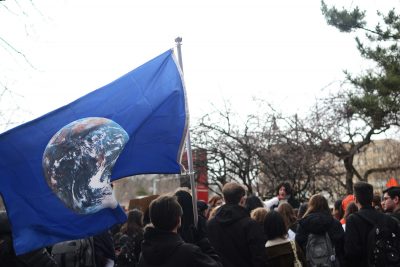Divest BU members will announce a new boycott campaign protesting Boston University’s investments in the fossil fuel industry on Friday at the BU Beach, following a defeated campaign to meet with President Robert Brown.
The new boycott campaign aims to pressure the Board of Trustees to divest by asking alumni to withhold donations to BU until it divests from companies exploring for fossil fuel reserves, according to Divest BU member Ivan Badanjak.
Badanjak said the new campaign is taking the club in a different direction following their unsuccessful initiatives earlier this year.
“We failed to get the administration to reconsider divestment,” the College of Arts and Sciences sophomore said. “Since it’s clear appeals by letter won’t affect the school administration, it’s important to find other ways to leverage our student power … We will [also] definitely look to re-establish our presence on campus and look for additional way[s] to pressure Brown and the Board of Trustees to listen to us.”
Before their announcement, members will perform in a skit titled “A Romantic Afternoon with President Brown and Board of Trustees,” featuring a Brown impersonator in a dating scenario.

Divest BU member Nicolette Matsangos said Friday’s event would help increase Divest BU’s visibility on campus and continue to leverage media coverage, which has gotten Brown’s attention.
“We want to put the pressure on President Brown and the Board of Trustees by increasing the visibility of BU’s investment in the fossil fuel industry, as well as trustee ties to the industry,” Matsangos, a CAS junior, said. “Our event Friday will hopefully bring the attention of more of the student body to divestment.”
Rachel Schlueter, a member of Divest BU, said she was content with the semester’s progress in gaining recognition and support on campus.
“Many students from Divest [BU] were involved in the startup of the [BU Coalition of Student Activists] with the aid of the Student Government Department of Advocacy,” the CAS junior said. “This coalition of students has supported the growth of other groups on campus and allowed direct conversation on best practices.”
BU spokesperson Colin Riley said so far this year, the Board of Trustees has thoroughly considered Divest BU’s proposals.
“It is clear that representatives from the student organization are not happy with one of the Board’s reasoned and prudent decisions,” Riley wrote in an email. “A fair reading will show the administration and the board followed a fair and open process for consideration … The work of the BU Climate Action Plan Task Force, created by President Brown last fall, will guide the next steps for the Board.”
Additionally, the Board of Trustees has been working with the Advisory Committee on Socially Responsible Investing in determining divestment action, Riley said.
Samuel Sherman, a CAS senior and member of the ACSRI, said the committee has been working with Divest BU, the Board of Trustees and the Climate Action Plan, a university-wide initiative to make BU more energy efficient.
Sherman said the ACSRI is responsible for determining the course of action the university should take from CAP’s proposal, which is in the process of developing a five-point action plan designed to “put climate change into a global problem with extends beyond BU’s campuses.”
“The ACSRI waits for student-led initiatives to be brought to the BU community’s attention and for that initiative to petition the ACSRI for action,” Sherman wrote in an email.
Another member of ACSRI, Questrom School of Business professor J. Robb Dixon, said he expects CAP’s recommendations to divest will be approved in the near future.
“The trustees committed in September to divest from fossil fuel companies engaged in the extraction of energy from coal and tar sands and to direct the university to create a climate action plan to limit and reduce its own carbon emissions,” Dixon said. “The trustees also committed to review that policy in five years.”



















































































































